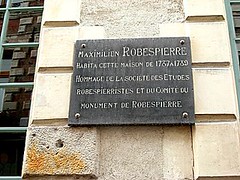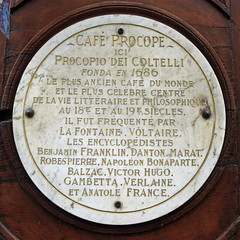Maximilien de Robespierre
Commemorated on 3 plaques
Ici a sejourne Maximilien Robespierre du 17 Juillet 1791 Jusqu'a sa mort le 28 Juillet 1794 (10 Thermidor an II)
English translation: Here stayed Maximilian Robespierre from 17 July 1791 Until his death on 28 July 1794 (10 Thermidor an II) [AWS Translate]
398 de la rue de Saint-Honoré, Paris, France where they stayed (1790-1793)
Maximilien Robespierre habita cette maison de 1787 a 1789 hommage de la société des Etudes Robespierristes et du Comité du Monument de Robespierre
English translation: Maximilien Robespierre lived in this house from 1787 to 1789 tribute to the Society of Robespierrist Studies and the Committee of the Monument of Robespierre [AWS Translate]
3 rue Robespierre, Arras, France where they lived (1786-1788)
Café Procope. Ici Procopio dei Coltelli fonda en 1686 le plus ancien café du monde et le plus célèbre centre de la vie littéraire et philosophique au 18e et au 19e siècles. Il fut fréquenté par La Fontaine, Voltaire, les Encyclopédistes, Benjamin Franklin, Danton, Marat, Robespierre, Napoléon Bonaparte, Balzac, Victor Hugo, Gambetta, Verlaine et Anatole France.
English translation: Café Procope. Here Procopio dei Coltelli founded in 1686 the oldest café in the world and the most famous center of philosophical and literary life in the 18th and 19th centuries. It was visited by La Fontaine, Voltaire, Les Encyclopédistes, Benjamin Franklin, Danton, Marat, Robespierre, Napoléon Bonaparte, Balzac, Victor Hugo, Gambetta, Verlaine and Anatole France.
13 rue de l'Ancienne Comédie, Paris, France where they visited




